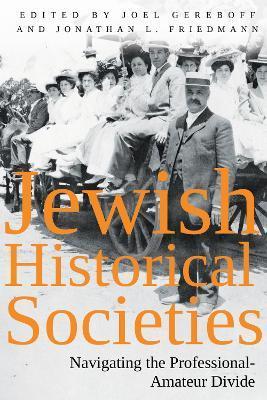Jewish Historical Societies: Navigating the Professional-Amatuer Divide

Jewish Historical Societies: Navigating the Professional-Amatuer Divide
Since the early 1950s, local and regional historical
societies have been an important part of the American Jewish landscape,
providing community outreach, housing archives, fostering research, and
publishing historical studies. This book charts the development, undertakings,
successes, shortcomings, and possible future of local and regional Jewish
historical societies in the United States. The lead chapter, by Joel Gereboff, explores the challenges
of constructing and presenting Jewish history and what disparities exist between
amateur historians and professionals in regards to standards, tools, methods,
analysis, and contextualization. Following an overview of key players, major
themes, representative organizations, and recurring critiques, the chapter
proposes ways to address the essential question: Can Jewish history on the
local and regional levels be more inclusive, better integrated with broader
trends of Jewish and general history, and improved according to scholarly norms
and expectations of social history? Following this are six chapters by leaders of local and
regional Jewish historical societies: George M. Goodwin of the Rhode
Island Jewish Historical Association; Jonathan L. Friedmann of the Western
States Jewish History Association; Mark K. Bauman of the Southern Jewish
Historical Society; Catherine Cangany of the Jewish Historical Society of
Michigan; Jeanne Abrams of the Rocky Mountain Jewish Historical Society; and
Lawrence Bell of the Arizona Jewish Historical Society. The selected societies
cover major regions of the country--New England, Midwest, South, Southwest, and
West--and, as such, are representative of the broader phenomenon of American
Jewish historical societies. These chapters are followed by a chronologically
arranged appendix listing American Jewish historical societies, their mission
statements, and their publications. Historical grounding is imperative for an
understanding of community and self. Equally essential is the type of
information that makes up that history, as well as how that information is
recounted and interpreted. No individual or community exists in isolation;
human history is complex, multilayered, and interwoven. While all history may
be local, it does not exist in a vacuum--this volume illuminates that concept
and situates it within the Jewish historical landscape.
Descrierea produsului
Since the early 1950s, local and regional historical
societies have been an important part of the American Jewish landscape,
providing community outreach, housing archives, fostering research, and
publishing historical studies. This book charts the development, undertakings,
successes, shortcomings, and possible future of local and regional Jewish
historical societies in the United States. The lead chapter, by Joel Gereboff, explores the challenges
of constructing and presenting Jewish history and what disparities exist between
amateur historians and professionals in regards to standards, tools, methods,
analysis, and contextualization. Following an overview of key players, major
themes, representative organizations, and recurring critiques, the chapter
proposes ways to address the essential question: Can Jewish history on the
local and regional levels be more inclusive, better integrated with broader
trends of Jewish and general history, and improved according to scholarly norms
and expectations of social history? Following this are six chapters by leaders of local and
regional Jewish historical societies: George M. Goodwin of the Rhode
Island Jewish Historical Association; Jonathan L. Friedmann of the Western
States Jewish History Association; Mark K. Bauman of the Southern Jewish
Historical Society; Catherine Cangany of the Jewish Historical Society of
Michigan; Jeanne Abrams of the Rocky Mountain Jewish Historical Society; and
Lawrence Bell of the Arizona Jewish Historical Society. The selected societies
cover major regions of the country--New England, Midwest, South, Southwest, and
West--and, as such, are representative of the broader phenomenon of American
Jewish historical societies. These chapters are followed by a chronologically
arranged appendix listing American Jewish historical societies, their mission
statements, and their publications. Historical grounding is imperative for an
understanding of community and self. Equally essential is the type of
information that makes up that history, as well as how that information is
recounted and interpreted. No individual or community exists in isolation;
human history is complex, multilayered, and interwoven. While all history may
be local, it does not exist in a vacuum--this volume illuminates that concept
and situates it within the Jewish historical landscape.
Detaliile produsului












